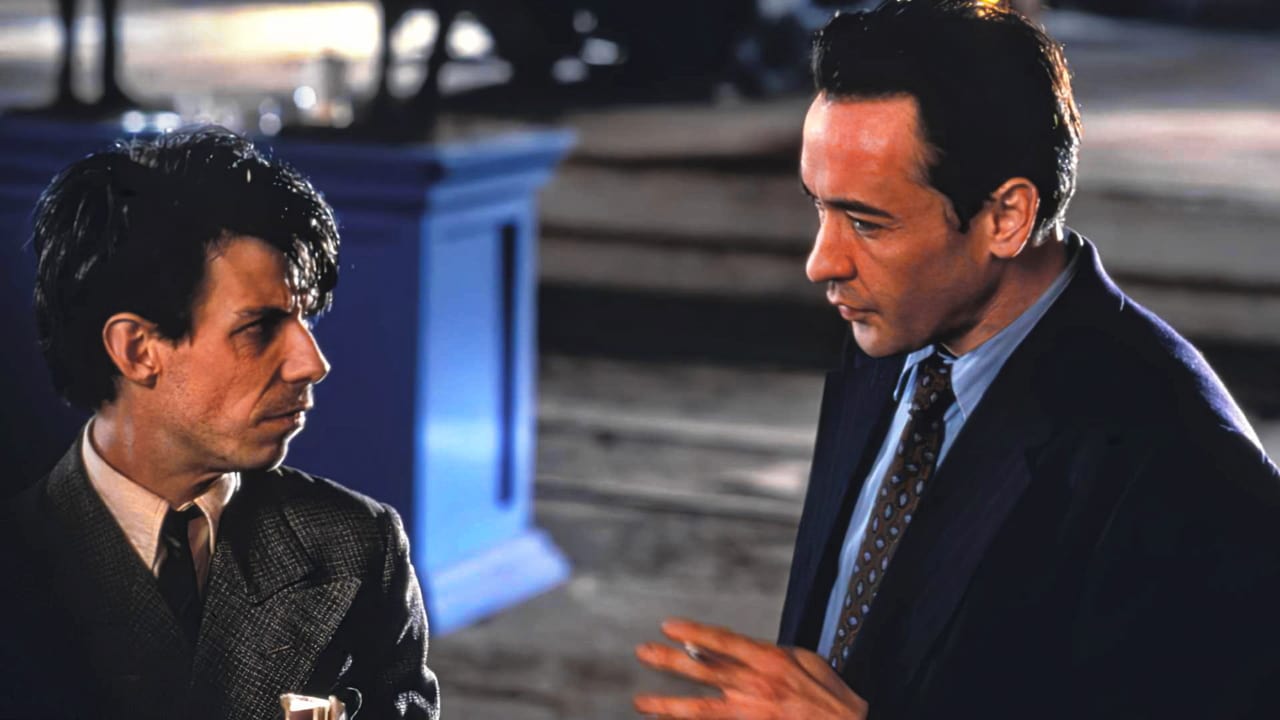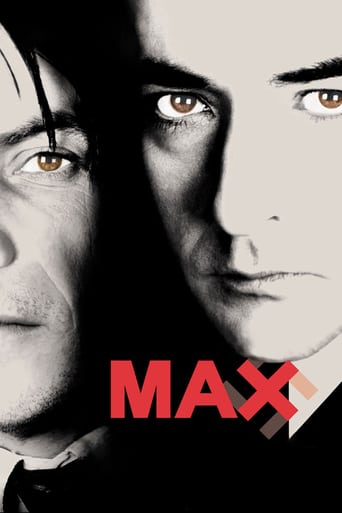Laikals
The greatest movie ever made..!
RyothChatty
ridiculous rating
Konterr
Brilliant and touching
Myron Clemons
A film of deceptively outspoken contemporary relevance, this is cinema at its most alert, alarming and alive.
museumofdave
I found this attempt to recreate how the monster Hitler evolved during the period after WWI highly admirable: it has a great sense of period, contrasting the comfortable civilized life led by German Jews with those of other German citizens who after the humiliation of WWI were not so comfortable; John Cusack is perfectly cast in a witty, mature role, a man who should be bitter and cynical, but is saved by his education.The problem for me is Adolph--how can anyone play Hitler? Lots of great actors have attempted the task--Guinness, Richard Basehart, Anthony Hopkins, and for comedy Chaplin and Ionesco's favorite, Bobby Watson--but only one has captured the fiendish maniacal madness that the man must have had to induce mass hypnotism on a nation, to persuade civilized folks to exterminate another race, and that is Bruno Ganz in the splendid end-of-days drama Downfall, and we only meet him in the last doomed days of the Third Reich.Noah Taylor does his level best to meet the challenge of the developing messianic leader, and, in the course of the film, many excellent arguments about the nature of art are poised; but ultimately the film did not work for me because I'm not sure one can effectively portray Hitler--or Garbo--or Einstein--I'm sure you could make up your own list. The film is never dull, and except for a predictable last five minutes, thoughtful and provocative.
samkan
MAX should be seen as a film about the many roads we face at turning points in our lives and the arbitrary, chaotic circumstances that influence what path we ultimately take. A corollary theme is the random selection -the unfairness- of birth, station in life, class, etc. In this respect the maker of MAX would be hard pressed to come up with a better setting that post WWI Germany! I disagree with those faulting historical inaccuracies. They appear to miss the point entirely. The only legitimate "fact" we must be concerned with is that Hitler indeed had a burning desire to be an artist (though I think his setting was Vienna, not Munich) and had he been successful and/or accepted as such there's a strong likelihood he'd never encountered politics (or at least on the scale he did). MAX' pure invention of Hitler's racist influences and his start to power merely indoctrinate and I didn't find them at all offensive. The invention of Cuzack's Max is a clever -and direct- counterpoint to Hitler's social circumstances. The "bonding" of Hitler and Max shreds, trashes, etc., the pseudo-logic of National Socialism in particular and racism and prejudice in general. Applause is warranted.Noah Taylor is nothing less than spectacular. John Cuzack is again a gem. The rest of the cast is reserved yet hardly a character or piece of dialog is throwaway. Just a tremendous achievement.
Malcolm Taylor
"Max" is perhaps one of the most profound films I have ever seen.Max: Where is the work, Hitler? I watched it on my little portable DVD player, expecting to have it on as background. No chance. This movie is riveting from start to finish. It contains an exceptionally brave performance from the young Noah Taylor. John Cusack makes me wish I could be his friend and hang out in his world. He is such a gifted actor, making everything he does seem so natural and effortless. The film is full of great lines: "It's easier to fight a bull from the Barrera." "What was it your brother said about art. Baked Air. Brilliant." To quote just a few.What made this film so relevant to me is that I could identify with the frustrations of the young Hilter as an artist. How he can't get past his own inner barriers to accept art in all its forms. How he is unable to paint his own story and has to destroy his canvasses. This frustration leads him to strive for power and control. Fueled by anger, masking his fear of failure as an artist, he begins his journey in a direction few can continue to identify with.Even as an artist he was more concerned with the trappings of success and fame: to be admired over the influential artists of his era. Yet he didn't put in the time. "Where is the work, Hitler?" "Ernst is up at the crack of dawn." This film is so well observed. For me it serves as a great parable of the artist vs critic debate. Hitler calls politics the new art. And the story seems to let him get away with this unchallenged assertion. But really how can a politician ever be an artist. An artist must be brave enough not to be liked so long as he reveals the truth of human nature. A politician will sacrifice truth in order to be liked by the widest possible demographic. An artist is charged with mining truth to allow us a collective understanding. Where as a politician is a pitch man for a his party's political propaganda. As this movie so deftly shows Hitler to be.I love that line Cusack has quoting Nietzsche, "anti-semitism is the ideology of those who feel cheated." A must see film for anyone who's ever struggled with finding their "true" voice and choosing the harder path in life.
garundaboink
This film mirrors Hitler's own speaking style in the way it jumbles the truth, weaving fact with fiction in such a frustrating blur one can only respond to what it says by blurting emotional responses at the screen. In Ian Kershaw's exhaustive study "Hitler", and quite fully supported by the semi-autobiographical "Mein Kampf", we find that Hitler had already been a struggling artist (and had given it up) long before the outbreak of World War One, had a fully developed political agenda rife with anti-Semitism which was the Zeitgeist of the day(feeling of the times), and was hired by the military to give oratory in the public parks because of an already well developed talent for his anti-Jewish harangues. His talent for the diatribes was noted by the army because his comrades in the trenches had become sick of listening to the endless vitriol and had complained to higher-ups "that he wouldn't shut up". All the qualities that Hitler is portrayed by this film to have developed in some form of crisis while deciding between art or politics, this artistic flair for polemics, had already taken shape many years before. In "Mein Kampf", one reads from Hitler's own pen that the question of whether the Hasidic Jew he encountered "was a German" arose when he was in Vienna, which was about 10 years before the start of World War One. Curiously, Hitler himself was not a German either! There are many anachronisms in this film. One merely has to see a German military greatcoat of the era in a photograph to know that what Hitler was wearing was probably some Canadian military surplus of WWII. The rest of the costumes were very anachronistic as well, looking like the costume manager just rummaged through the neighborhood Sally Anne for old clothes. For instance, in 1918-1919, at formal gatherings people still wore top-hats. Hitler wore a top-hat to his inauguration in 1933! Collars were higher on the neck, sports coats had belts in the back at least, if not in the front too, and the leading edges of coats had round or tapered edges not square. The houses were decorated in a fashion not seen until Ikea came along, arc-welding, cars, and on and on. Some of the coarse language by Max's women friends can be seen to be out of place as well.Although all of these inaccuracies turn the film into a "what if" scenario, it still scores a few points with its implied assertion of Hitler's sexual dysfunction and the interesting proposition that if Hitler simply got laid at an earlier age his interests in life may have been diverted away from murder and imperious expansionism. But then again, he may simply have been a happily married despot. One tends to forget in these deep studies of Hitler's mind that it required an equally disturbed national psyche to follow him into the abyss that was Nazi Germany.When we examine Germans and the question of Nazi Germany with any truth, we see an advanced people much like ourselves, and so the examination should become one of introspection. People incorrectly try to pick apart the mind of Adolf Hitler looking to pin all the blame on a curious freak of nature, forgetting the influence of Nietzsche, and the thousands of anti-Semitic publications of the era. The moral, missed by the authors and so hard for the history re-writers to accept, is that we are all capable, given the correct circumstances, of becoming Nazis.

